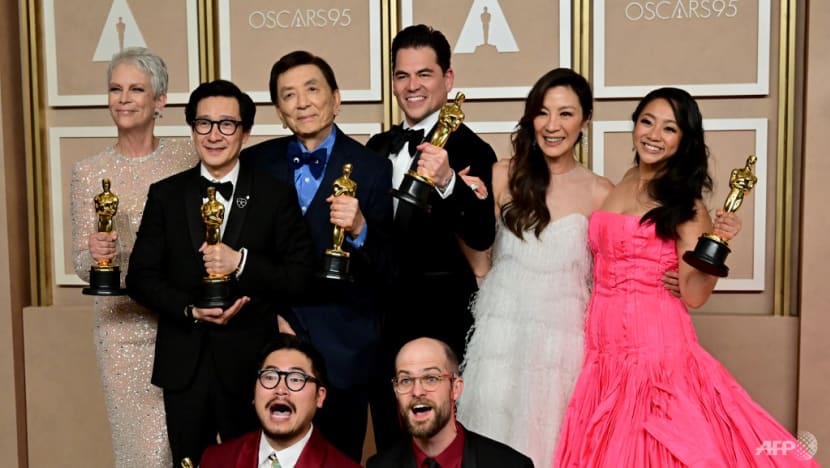Commentary: Films starring Asians are winning worldwide acclaim - but why not Hong Kong movies?
After the end of their golden era in the 90s, Hong Kong films are seeing a domestic revival. But they still struggle at international box offices, says Jacky Leung.

LONDON: Everything Everywhere All At Once, starring Michelle Yeoh and an Asian-majority cast, is now the most awarded movie in history with 158 major recognitions in a single award season.
This is a huge triumph that few could imagine just years ago. Asians were once regarded as ineligible for the top billed cast, just as veteran actor James Hong, the grandfather in Everything Everywhere All At Once, said in a speech after winning his first Screen Actors Guild award.
But other big-budget films such as Crazy Rich Asians, Shang-Chi And The Legend Of The Ten Rings and Disney’s Mulan remake have been giving Asian actors from Tony Leung to Donnie Yen more exposure in Western cinema.
What Yeoh, Leung and Yen have in common is that their careers began in Hong Kong. Indeed, Western films that feature martial arts - Everything Everywhere All At Once included - borrow heavily from Hong Kong’s rich cinema tradition.
But films made in Hong Kong no longer enjoy the same global renown they once did in the 80s and 90s. In the meantime, other Asian films like Telugu action epic RRR and South Korean dark comedy Parasite have made it to the Oscars.
HONG KONG MOVIE INDUSTRY NOW IN LIMBO
In their golden era, Hong Kong movies were defined by dangerous action stunts and a cinematic filming style. The high volume and massive variety of productions, from Stephen Chow's comedy, Chow Yun-fat's drama to Leslie Cheung and Andy Lau's love stories, won fans overseas.
However, the city's movie industry is now in limbo. Hong Kong, once the Hollywood of the East, has seen a drastic 80 per cent decrease in local production in the last 30 years, with fewer than 30 local movies shown in theatre last year.
Stiff competition from Hollywood, as well as Chinese, Taiwanese and Korean productions since the millennium diminished local and international attention for Hong Kong movies. Rising production costs further triggered the downfall.
While there is still heated debate over whether Hong Kong movies have died, the local film industry has had a surprising rebound after cinemas reopened in the second half of 2022.
Three local productions have surpassed the 2016 Korean action thriller Train To Busan as the highest-grossing Asian movie in Hong Kong. Courtroom drama A Guilty Conscience has become the first non-English film to join the HK$100-million (US$12.7 million) box office club, which until now was dominated by Hollywood blockbusters.
Multiple factors contribute to the comeback of Hong Kong films. First, it follows the broader recovery of local show business. Several movies featuring Hong Kong boy band MIRROR cracked HK$30 million. The lack of entertainment available during the zero-COVID era also generated demand for comedies and led to the success of Table For Six, which grossed HK$77 million.
Moreover, the sentiment in the city favours the rebirth of local movies. Influencers and netizens heavily promoted Warriors of Future, Hong Kong’s first big-budget sci-fi movie, after its poor box office result in China. This reflects the urge to protect local culture and Hong Kong identity since the anti-extradition protests of 2019 and 2020.
OFF THE RADAR FOR INTERNATIONAL AUDIENCES
But outside of their domestic market, Hong Kong films struggle. International box office results indicate that Hong Kong movies do not appeal to audiences overseas.
Even with the presence of familiar faces like Louis Koo and Sean Lau Ching Wan in Warriors of Future, the reality is that no Hong Kong film can gross more than 1 billion yuan (US$146 million) in China. In Taiwan, A Guilty Conscience failed to reach TW$1 million (US$32,800) after a week of showing, a benchmark that new Hong Kong movies are also unlikely to meet now.
Many domestically well-received Hong Kong movies don't even have a chance to show in Southeast Asia, historically an important market. The migration wave has allowed more Hong Kong movies to be shown in the UK. However, my observation in London cinemas is that the ratio of British attendees is much lower compared to Korean and Japanese movies.Some may argue that Cantonese-language films are relatively arthouse. Topics like legal proceedings and complex family drama lessen their mainstream appeal.
However, the success of Korean and Japanese arthouse films like Decision To Leave and Drive My Car reveals the key reason why Hong Kong films fall behind: Marketing. Hong Kong movies are off the radar for overseas audiences, and even if cinephiles have a blurry notion that one is showing, there is a lack of urgency to watch it when there are other international offerings.
Therefore, a rebranding in international markets to arouse foreign viewers' interest is essential. Campaigns are needed to tell audiences that Hong Kong movies have evolved from the old action flicks to stories with a more human touch.
The Hong Kong government has subsidised new directors to improve the quality of local movies over the last decade. The return of local audiences is a good sign for the industry’s recovery.
Still, creative freedom and overseas marketing resources are needed to make Hong Kong movies great again. The Korean experience shows that it may take years of promotion to gain international recognition, which can only be achieved with long-term financial support.
Asian actors are shining worldwide nowadays. With a stable supply of good movies and publicity campaigns, it could be perfect timing to bring Hong Kong movies back to the spotlight again.
Jacky Leung is an award-winning journalist who has worked in multiple Hong Kong TV and radio news stations. He is currently based in London.
















